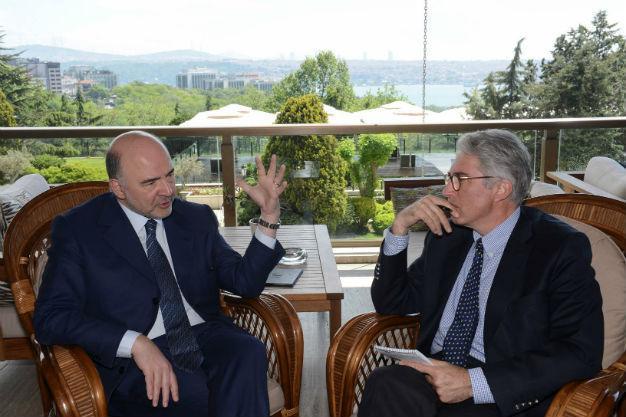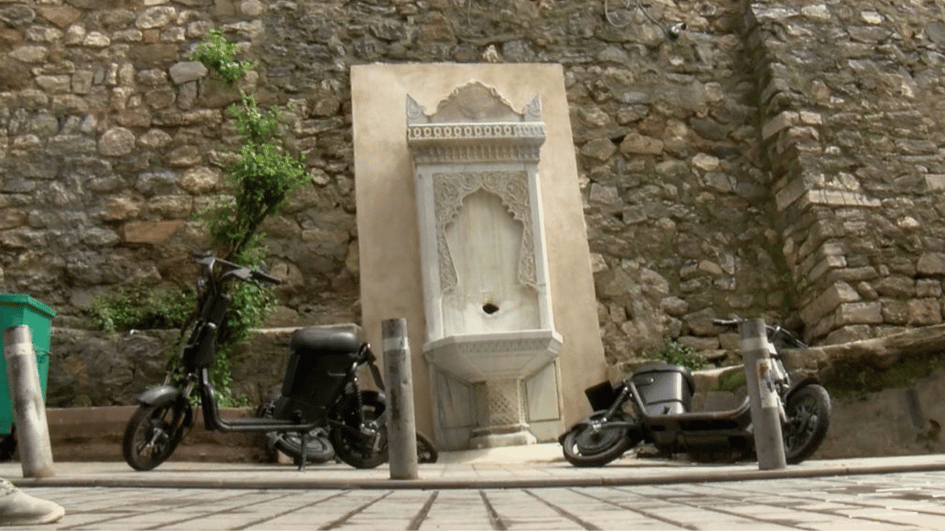Free court, free press important for EU investments in Turkey
Murat Yetkin
 “The immigration deal is very important for the European Union and relations with Turkey; actually it has the highest importance now,” said European Commissioner for Economic and Financial Affairs, Taxation and Customs Pierre Moscovici during an interview on April 25 in Istanbul. “We want to revitalize relations with Turkey in every field, including [the] economy. But for that structural reform, including fiscal policies, judicial reforms [and] freedom of press are highly important as well,” Moscovici continued. “Investments need stability, predictability and security, that is why we talk about reforms and that includes free courts and free press, as I mentioned to Turkish ministers I talked to this morning.”
“The immigration deal is very important for the European Union and relations with Turkey; actually it has the highest importance now,” said European Commissioner for Economic and Financial Affairs, Taxation and Customs Pierre Moscovici during an interview on April 25 in Istanbul. “We want to revitalize relations with Turkey in every field, including [the] economy. But for that structural reform, including fiscal policies, judicial reforms [and] freedom of press are highly important as well,” Moscovici continued. “Investments need stability, predictability and security, that is why we talk about reforms and that includes free courts and free press, as I mentioned to Turkish ministers I talked to this morning.”Moscovici was in Istanbul to attend the High-Level EU-Turkey Economic Dialogue meetings hosted by Turkish Union of Chambers of Commerce (TOBB) chairman Rifat Hisarcıklıoğlu. There he met Deputy Prime Minister Mehmet Şimşek, Economy Minister Mustafa Elitaş and Trade and Customs Minister Bülent Tüfenkçi. Three other European commissioners were there in the meetings: Jyrki Katainen, in charge of growth and Investments; Johannes Hahn, in charge of enlargement; and Karmenu Vella, in charge of the environment and maritime affairs. A number of Ankara ambassadors to EU countries were present in the meetings as well.
Moscovici is a European politician who is familiar with relations with Turkey. He was the French EU affairs minister in 1999 when Turkey was admitted as an official candidate for the EU. He is also a co-founder of Instut du Bosphor, a Turkish-French forum to promote Turkey-EU relations, before becoming the French finance minister.
“German Chancellor Angela Merkel, President of the European Council [Donald Tusk] and [the] deputy head of the European Commission, Frans Timmermans, were in Turkey over the weekend,” Moscovici underlined, “And our presence today also shows the importance we give to relations with Turkey. It is not only for [the] immigration crisis, not only for business, but for the values we share as well. We want this country to stay what it was since the foundation of [the] republic, as a secular democracy, no matter which party is in power, respecting its popularly elected leaders President Tayyip Erdoğan and Prime Minister Ahmet Davutoğlu,” Moscovici said.
About the much debated visa-free EU travel rights for Turkish citizens as a part of the Syrian immigration deal with the EU, Moscovici said the commission was decisive to suggest the case to the EU Council of Ministers if Turkey fulfilled the benchmarks by May 4. “It’s up to the council to decide what kind of a decision they are going to make,” he said, amid reported discontent from a number of EU members, including Moscovici’s home country of France.
Turkey’s desire not to be left out of the Transatlantic Trade and Investment Partnership (TTIP) has been another subject in the Turkey-EU dialogue meetings in Istanbul. Moscovici said they promised the Turkish side to bring up the subject to the commission once again, since Turkey is a member of the EU Customs Union. “Everybody must cool down,” he said. “The negotiations with the U.S. [have] not ended yet and after that there are several years to be concluded.”
Moscovici also said if the Greeks and Turks in Cyprus agreed on a reunification plan, which he said he was hopeful for, then surpassing the obstacles in five more chapters for membership negotiations, including chapters on Customs Unions, judicial reform and rights and freedoms in Turkey, would be possible.











